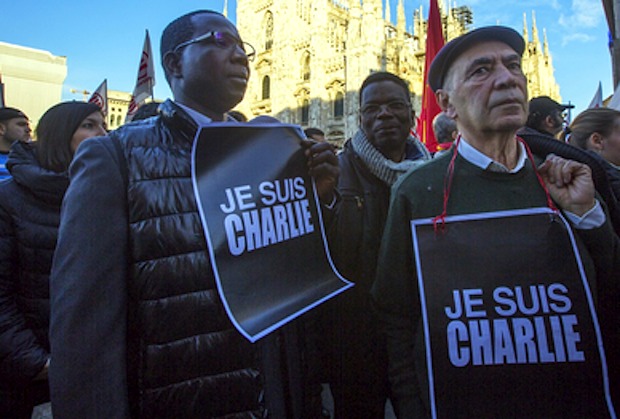The rallying cry Je Suis Charlie (“I am Charlie”), referring to the French magazine Charlie Hebdo, where 11 journalists were murdered in the name of Islam last week, has become popular on placards, posters, t-shirts and more – not only in Europe, but here in the U.S., where pro athletes recently sported the slogan on their pregame workout clothes.
But what does it mean to identify yourself with Charlie Hebdo, a publication which for years has specialized in being not only purposefully provocative, but blatantly offensive – and not only to Muslims, as if that weren’t bad enough?
Some writers, such as The Daily Beast‘s Arthur Chu and New York Times’ David Brooks, are asserting that while it should go without saying that nobody deserves to die because of words or images they create or publish, they want to be clear: They’re most certainly not Charlie. Each, in his own way, differentiates himself from the consistently foolish, sometimes grotesque antics that represent Charlie Hebdo. I get that. I even appreciate their point; namely, that freedom of expression does not justify self-aggrandizing mockery of other people and their ways of life.
What I don’t get, and in fact, totally reject, is their rush to distance themselves from the victims at a moment of such horrible hurt and sorrow. Even if their analysis of Charlie Hebdo is correct, and much of it is, that really doesn’t matter right now. There will be time for all of that later.
You don’t need to agree with any of the content produced at ‘Charlie Hebdo’ to say: Je suis Charlie.
All that matters now is the bright line that must exist between those who murder in the name of what they believe, and those who don’t. There is nothing nuanced about that distinction, nor should there be. As important as nuanced thinking, cultural sensitivity and social responsibility are for all people who put their ideas into the public square, now is not the time to make that point, and it’s hard not to wonder if those who do so are not themselves being a bit purposefully provocative — and dangerously so.
You don’t need to be Jewish to proudly proclaim, Je suis Juif (“I am a Jew”), or a police officer to declare, Je suis Ahmed (“I am Ahmed”). You simply need to identify with the humanity of those who were slaughtered at the Paris kosher market Hyper Cacher, or with the Muslim police officer who was assassinated in the line of duty outside Charlie Hebdo‘s offices.
You don’t need to agree with all, or even any, of the content produced at Charlie Hebdo to say: Je suis Charlie. You simply need to know where, and with whom, you stand when it comes to terrorism and murder.
So with all the criticism that could be lobbied at the magazine, at some point in the future, in these days and weeks we’re in now, I’m proud to say Je suis Charlie. I hope that you are, too.

Listed for many years in Newsweek as one of America’s “50 Most Influential Rabbis” and recognized as one of our nation’s leading “Preachers and Teachers,” by Beliefnet.com, Rabbi Brad Hirschfield serves as the President of Clal–The National Jewish Center for Learning and Leadership, a training institute, think tank, and resource center nurturing religious and intellectual pluralism within the Jewish community, and the wider world, preparing people to meet the biggest challenges we face in our increasingly polarized world.
An ordained Orthodox rabbi who studied for his PhD and taught at The Jewish Theological Seminary, he has also taught the University of Pennsylvania, where he directs an ongoing seminar, and American Jewish University. Rabbi Brad regularly teaches and consults for the US Army and United States Department of Defense, religious organizations — Jewish and Christian — including United Seminary (Methodist), Yeshivat Chovevei Torah (Modern Orthodox) Luther Seminary (Lutheran), and The Jewish Theological Seminary (Conservative) — civic organizations including No Labels, Odyssey Impact, and The Aspen Institute, numerous Jewish Federations, and a variety of communal and family foundations.
Hirschfield is the author and editor of numerous books, including You Don’t Have To Be Wrong For Me To Be Right: Finding Faith Without Fanaticism, writes a column for Religion News Service, and appears regularly on TV and radio in outlets ranging from The Washington Post to Fox News Channel. He is also the founder of the Stand and See Fellowship, which brings hundreds of Christian religious leaders to Israel, preparing them to address the increasing polarization around Middle East issues — and really all currently polarizing issues at home and abroad — with six words, “It’s more complicated than we know.”

